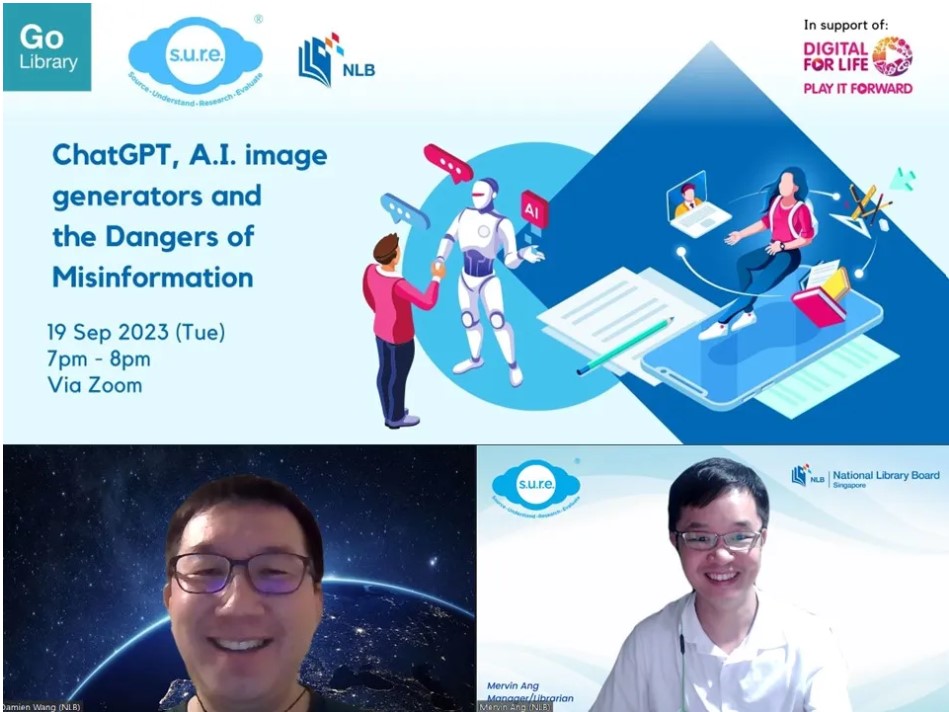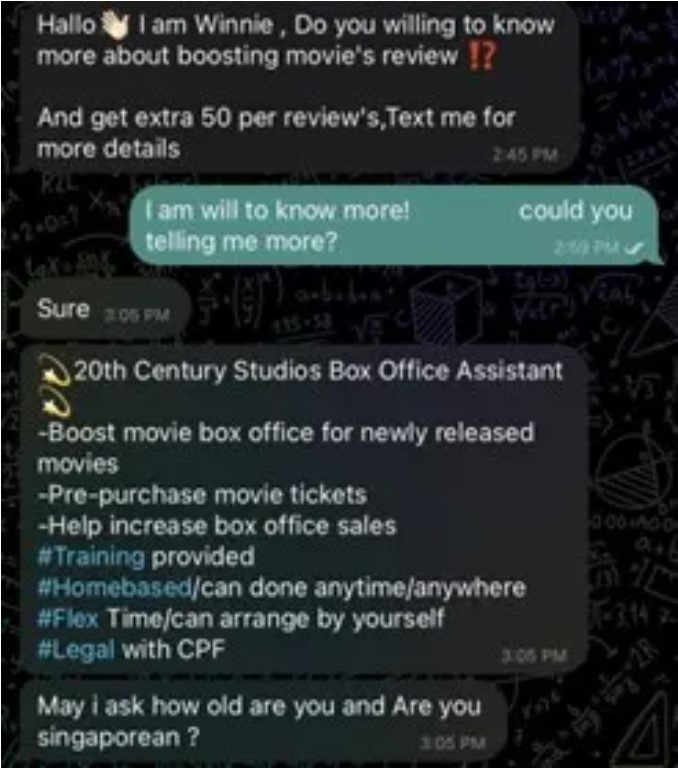Tech

-
ChatGPT, AI image generators and the dangers of misinformation

In this webinar, learn about the advantages and disadvantages of generative A.I. tools and how they might be exploited by bad actors to create online falsehoods.
- The information reflected in this webinar is accurate as of September 2023 and is subject to changes if viewed at a later date
- To join more NLB programmes on generative A.I., click here
- To read more content on generative A.I., click here
Watch the video recording below, and download the sharing deck here
-
A.I. Chatbots: The Good, The Bad, and The Future
In this panel discussion organised by NLB, learn from industry experts on the role of A.I. chatbots in the current and future world.
Date and time: Wednesday, 26 Apr 2023, 4:00pm - 5:30pm
Location: National Library, The Pod
100 Victoria Street Level 16 Singapore, 188064
This event has ended.
About the Programme
A.I. chatbots have become increasingly popular in recent years as they have the potential to revolutionise the way we communicate and interact with technology. Join our expert panel as they explore the current state of A.I. chatbots, the benefits and limitations of this technolosgy, and their future implications for various industries. Learn from industry experts who are familiar with communication, education and A.I. chatbot technology, each with unique insights and perspectives on this topic. Participants will gain a deeper understanding of the role of A.I. chatbots in the current and future world.
Speakers

Dr Natalie Pang
Dr. Pang is Deputy Head at the Communications and New Media Department, and Principal Investigator at the Centre for Trusted Internet and Community at the National University of Singapore. Other than her academic work, she also heads NUS Libraries as University Librarian. In Singapore, she currently serves as a member of the Media Literacy Council and Special Advisor to the Digital and Information Literacy Community of Practice at the National Library Board. With regard to A.I., she contributes as a member of the University Policy Workgroup for AI in Teaching and Learning at NUS. More recently, she has also contributed insights as a stakeholder to a report published by UNESCO and Mila – Quebec Artificial Intelligence Institute on “Missing Links in AI Governance”.

Prof. Andrew Prahl
Prof. Prahl (PhD University of Wisconsin-Madison) is an Assistant Professor at the Wee Kim Wee School of Communication & Information at Nanyang Technological University. Andrew’s research investigates the effects of disruptive technologies on human communication and society. Some of his recent work looks at the issues of humans being replaced by automation in the workplace, what AI means for advertising and public relations, and how generative AI technologies are redefining human creativity. He also draws upon a decade of experience in the advertising, outreach and public relations industry in his research.

Mr. Chuang Shin Wee
Mr. Chuang is the Founder and CEO of Pand.ai, a Singapore-headquartered specialist in conversational AI. Today, Pand.ai serves a number of blue-chip companies across Southeast Asia including Allianz, Bangkok Bank, CIMB, Great Eastern, MSIG and Schroders. Prior to founding Pand.ai, Shin Wee was the Head of Digital Banking for Standard Chartered Bank in China, where he built a number of award-winning digital capabilities for the bank. In 2013, he was named “Top 50 Business Innovators in China” by CBN Weekly for inventing an ATM software that helped the bank reduced the cost per new-to-bank lead by more than 90%.

Prof. Edson Tandoc Jr. (Moderator)
Prof. Tandoc Jr. is an Associate Professor and the Associate Chair for Research at the Wee Kim Wee School of Communication and Information at Nanyang Technological University in Singapore, where he is the Director of the Centre for Information Integrity and the Internet (IN-cube). He is also an Associate Editor of two journals: Digital Journalism and Human Communication Research and the Vice Chair of the Journalism Studies Division of the International Communication Association. His studies have focused on the impact of journalistic roles, new technologies, and audience feedback on the news gatekeeping process.
-
What Popular Culture Teaches Us About the Spread of False Information
According to Oxford Bibliographies Online, popular culture constitutes ‘the set of practices, beliefs, and objects that embody the most broadly shared meanings of a social system’. The fact that the spread of false information has long been depicted in popular books and films, then, signals that false information is a striking aspect of our society. Indeed, from the fake news published by The Daily Prophet in the Harry Potter series to the portrayal of how sensationalist news contributed to the outbreak of the Spanish-American war in Citizen Kane, depictions of false information in popular culture are not hard to come by.
However, in recent times, portrayals of the spread of false information in popular works have changed drastically. While newspapers are the medium through which false information is spread in Harry Potter and Citizen Kane, recent popular works allow us to recognise that false information can take many forms and is no longer necessarily rooted in newspapers. One film franchise which demonstrates this is the Spider-Man series set in the Marvel Cinematic Universe.
spoilers ahead!

Image by Alexander Jawfox, retrieved from Unsplash
Mysterio’s Manipulation
According to the screenwriters of Spider-Man: Far From Home, the film script was influenced by their observation that false information is easily accepted as truth by many, especially on social media. This guided their crafting of Mysterio, the main villain of the film. Mysterio’s mastery of deception is apparent as, throughout the film, he uses illusions to trick and manipulate Peter. However, his most damaging fabrication comes during the heart-racing mid-credits scene of the film, when he frames Peter as a murderer.
Mysterio had filmed Peter verbally instructing drones to ‘execute’ a series of cancellation protocols to cease the damage that Mysterio had done. However, in the video, Peter’s words (‘execute them all!’) are removed from his intended context as he is seen uttering this instruction while surrounded by the destruction which had been wrecked by the drones. Consequently, the masses are misled into believing that Peter is a murderer. This shows us just how easily one can create false information. One does not need specialised video editing skills to trick people with distorted evidence — even raw footage can be misleading when removed from its original context.
Peter Parker in a Pickle
The result of Mysterio’s actions are revealed in the next film, Spider-Man: No Way Home, in which Peter is interrogated by federal agents for a crime he did not commit. Although he eventually manages to avoid all charges, Peter’s reputation is tarnished — not only is he assaulted in the streets, he and his friends are also unable to get into their desired college because of the controversy surrounding them. Evidently, the spread of false information can inflict immense damage.
Stay Safe with the S.U.R.E. steps!
It might be tempting to dismiss Peter’s mishap as merely a work of fiction but, in the real world, quotes, images and videos have in fact been taken out of context to stir up public opinion. For instance, during the Russian-Ukraine crisis, many misleading videos were circulated online: a video of an explosion in China was framed as an explosion in Ukraine and a video of Russian aircraft flying in formation over Moscow as part of a rehearsal for an air show was similarly framed as footage from Russia’s invasion of Kyiv (to learn more about false information published during the Russian-Ukraine crisis, click HERE.
To avoid falling for false information, it is a good habit to search for the original source of information you come across and check whether the information has been accurately represented. For a step-by-step guide on how to detect false information, check out the S.U.R.E. steps HERE. It is better to be S.U.R.E. than sorry — after all, even superheroes can be victims of the spread of false information!
References:
Chitwood, A. (2019, July 17). Spider-Man: Far From Home Writers on Mysterio and Following Endgame. Collider. https://collider.com/spider-man-far-from-home-interview-erik-sommers-chris-mckenna/
Kidd, D. (2017). Popular Culture. In Oxford Bibliographies Online. doi: 10.1093/obo/9780199756384-0193
Lee, E. & Sadeghi, M. (2022, February 28). Fact Check Roundup: What’s True and What’s False about the Russian Invasion of Ukraine. USA Today. https://www.usatoday.com/story/news/factcheck/2022/02/28/fact-check-whats-true-and-whats-false-invasion-ukraine/6952717001/
Watts, J. (Director). (2019). Spider-Man: Far From Home[Film]. Columbia Pictures and Marvel Studios.
Watts, J. (Director). (2021). Spider-Man: No Way Home [Film]. Columbia Pictures and Marvel Studios.
This article was written by Hoh Zheng Feng Sean.
Sean was an intern with the Programmes & Services (Outreach) department in 2022. As an intern, he was primarily involved in the S.U.R.E./ Informed Citizenry Project and assisted with the running of programmes. In his spare time, he enjoys reading books and watching films from a wide range of genres. His favourite films of all time are Lady Bird, Titanic and City Lights.
-
How I Almost Got Hooked Into a Scam

I was in the middle of a group discussion for my university project when I received an unsolicited Telegram message from someone named Winnie. “Hello, I am Winnie, Do you willing to know more about boosting movie’s review!? And get extra 50 per review’s,Text me for more details.” I knew it was just another job scam message because of Winnie’s poor command of English and the fact that I was offered a job that I never applied for. However, I was very curious about how scammers operate. Confident that I would never fall for such a scam, I responded with a similarly-worded message. “I am will to know more!” That was the start of how I nearly got hooked into a scam.

Photo by Janna Aw (Screenshot)
Winnie claimed to be from a job recruiting agency in Singapore and asked for my particulars. Aiming to uncover how phishers operate, I fabricated a persona completely different from my real self. Winnie referred me to Liz, her client and my main point of contact. I questioned Liz about the company’s legitimacy, and she assured me that the company was real. She initially focused on getting me to register on a website to start reviewing movies but soon fostered an emotional connection by trying to befriend my false persona. Guilt and uncertainty arose as I wondered if I was the bad guy. My initial confidence started to waver.
However, Liz started getting impatient. Claiming that she could only send the registration link over after I had gone through a sign-up procedure with her, Liz started guilt-tripping me about my inaction. After I expressed my disinterest, Liz immediately deleted our chat history and blocked me, indicating that she was indeed a scammer. A scammer deleting or blocking their profile seemed to be a common tactic.
Had I been in a position where I desperately needed money, I might have fallen for the scam since Winnie and Liz constantly provided their credentials. Liz’s attempts to forge an emotional connection with my false persona (a tactic which many scammers use) and my lack of further research caused me to trust her more. All I did was a quick search to assess the companies’ existence, I had not been cautious enough.
In hindsight, one should never reply to such unsolicited messages as scammers usually fish for active numbers by messaging random combinations of numbers and outsource these numbers to other scammers. I noticed that I started receiving more unsolicited messages after responding to a scammer than before my experience with Winnie.
If you are uncertain if you are contacting a scammer, a quick search to find the information provided by the contact person is insufficient as scammers usually give the names of smaller companies and impersonate their employees to prove their legitimacy.Here are some ways to identify a scammer when receiving such unsolicited messages:
- Check the authenticity of the job offer with the company in question.
- Beyond finding the company’s existence, watch out for red flags such as a job recruiter messaging you regarding a job you never applied for.
- Conduct thorough research about the company and the person of contact.
- Look through scamalert.sg ‘s database to look for similar scam reports.
- Evaluate all the information gathered through your research; is this job opportunity real?
Ultimately, you should never share your personal information with strangers. While these job offers may look enticing, it is best to be cautious of something that sounds too good to be true! If I’ve learnt anything from my experience with Liz and Winnie, it is to never be complacent, conduct further research, and always take caution in protecting my personal information.
This article was written by Janna Aw.
Janna was a Programmes & Services (Outreach) intern with the S.U.R.E. team in 2022. She is a curious individual who is interested in communications and is concerned about the rising cases of scams in Singapore.
Reference
Zalizan, T. (2024, January 5) I responded to scammers offering me lucractive ‘job offers’. This was what happened. https://www.todayonline.com/singapore/i-responded-scammers-offering-me-lucrative-job-offers-was-what-happened-1795246
Collier, K. (2021, May 7). She responded to a smishing scam. Then the spam texts got worse. Experts explain why. Yahoo! News. https://news.yahoo.com/why-cyber-criminals-looking-steal-151858885.html?guccounter=1
Man arrested for Ponzi-like job scam involving watching movie trailers for money. (2022, April 7). Channel News Asia. https://www.channelnewsasia.com/singapore/ponzi-job-scam-movie-trailer-police-arrest-man-2612646
Randstad Singapore Press Statement: Scammers Impersonating Randstad Employees on Telegram. (2022, April 7.) Randstad Singapore. https://www.randstad.com.sg/about-us/press-releases/scammers-impersonating-randstad-employees-on-telegram/
Wang, Q., Liu, Z., Bernat, E. M., Vivino, A. A., Liang, Z., Bai, S., Liu, C., Yang, B., & Zhang, Z. (2021). Pretending to be better than they are? emotional manipulation in imprisoned fraudsters. Frontiers in Psychology, 12. https://doi.org/10.3389/fpsyg.2021.562269
Job scams. (n.d.). Scamshield. https://www.scamshield.gov.sg/i-want-protection-from-scams/learn-to-recognise-scams/job-scams/
Zalizan, T. (2022, January 27). I responded to scammers offering me lucrative ‘job offers’. This was what happened. Today Online.https://www.todayonline.com/singapore/i-responded-scammers-offering-me-lucrative-job-offers-was-what-happened-1795246
-
Be S.U.R.E. before you “add to cart”

Image credit: Pixabay
Drawn by its ostentatiously low prices and eclectic mix of products, and further intensified by the current pandemic, more Singaporeans have turned to online shopping.
With its heavily discounted prices and never-ending stream of vouchers, platforms like Shopee, Lazada, and Taobao are slowly taking over department stores and shopping malls. Not only that, but they also employ the use of mini-games and lucky draws to attract consumers to open the application and spend some digital cash. In return, consumers gain tiny discounts or credits that they can exchange for even more vouchers and discounts.
In some ways, it’s almost as if these applications are giving out free money. Yet, even with its cost-saving features, we can’t help but wonder how else we can leverage on its convenience and accessibility to get as much as we can- while spending as little as possible.
Being a discerning shopper is possible with S.U.R.E. skills in hand.
S.U.R.E. distils key Information Literacy (IL) concepts into 4 simple ways:
· Source: Look at its origins. Are they trustworthy? Make sure that the source of information is credible and reliable.
· Understand: Know what you’re reading. Search for clarity. Look for facts rather than opinions. Question personal biases.
· Research: Dig deeper. Go beyond the initial source. Investigate thoroughly before making a conclusion. Check and compare with multiple sources.
· Evaluate: Find the balance. Exercise fair judgement. Look from different angles. There are at least two sides to every story.
Read on to find out how you can apply the S.U.R.E. steps when you next shop online!
Look at the sellers. Are they trustworthy?
(Check your Sources and Understand the information provided)

Image credit: Pixabay
Falling prey to e-commerce scams and losing your money is the furthest course of action from saving it. Keep yourself safe by checking who exactly you are buying from. How many sales have they made? How have buyers reviewed them? Before buying anything, it is always a good practice to make sure that you’re spending money on a reputable seller.
Compare products.
(Research across websites)

Image credit: Pixabay
Assuming you’ve checked your sellers and verified their credibility, there’s an extra step you can take to ensure that you will only be investing in the most value-for-money product you can find. Cross-checking the same product against different sellers- and even platforms will make sure you’re not spending $50 on something worth $40. Sellers will definitely try to upsell their products, so it’s worth conducting a little bit of research before you whip out your wallet.
Don’t fall prey to marketing tactics
(Evaluate before making a decision)

Image credit: Pixabay
It’s easy to constantly keep adding to your cart and convince yourself that you need something especially during shopping events like 11.11 and Black Friday. These events encourage you to spend for the sake of it out of the fear of missing out on vouchers and deals. However, don’t fall prey to these marketing tactics! Companies like Shopee give out vouchers almost every day, so you can afford to buy only when you need it.
And that’s how you can apply the S.U.R.E. steps to your online shopping and avoid getting duped!
References:
https://dollarsandsense.sg/busy-singaporeans-guide-using-saving-money-shopee/
https://blog.hubspot.com/marketing/how-to-write-blog-post-outline
This article was written by Amelia Yew. Amelia participated in the NLB Work Experience Programme with the Programmes and Exhibition Division in December 2021.*
-
My guilty love affair with food hack videos
I have a confession to make: I love food hack videos. It is soothing to watch chefs perform magic, transforming things into other, better things with seemingly no mess or effort. Condensed milk, microwaved for ten minutes, becomes perfectly smooth, golden-brown caramel; melted strawberry ice cream is whipped into creamy pink icing in seconds. In the land of food hack videos, every food item is photogenic, every recipe takes ten minutes or less, and there are never any dishes to wash.

None of this, of course, is true. Anyone who has ever cooked a meal will know that cooking is messy and time-consuming, and that real food seldom looks Instagram-worthy. And aside from being unrealistic, food hack videos contain dangerous misinformation. Food vloggers, lifestyle bloggers, and even the BBC have explained how “white strawberries” made with bleach are actually poison, or how trying to make grilled cheese in a sideways toaster might actually burn down your house.
That does not mean I have to stop watching. After all, entertainment does not have to be true to be fun, and now that I know the truth, I feel like I’m safe. Misinformation can only hurt me if I believe it.
The problem, though, is that it is often too easy to suspend our disbelief. Think of the many films each year which claim to be “based on a true story” despite containing as much fiction as fact. It is common knowledge that even the most carefully-researched of films will have changed some facts to fit the story, yet it is still so easy to see such films as truthful records of events. At least it is for me: even when I do look up the facts behind a film, I often find myself forgetting all about them. Of course I believe these facts are true – but it was the film that I enjoyed, and so it will be the film, and its version of events, that I remember.
What these films have in common with food hack videos is that they are compelling precisely because they are unreal. Fiction can do amazing, impossible things; facts, on the other hand, can often seem boring and frustrating. The truth can ruin a good video, or a good, satisfying story – and so, sometimes, an untrue story can become easier to believe than a true one.
It is for this reason that we must be careful when we choose to believe something that sounds true, or comforting, or just like good common sense. We are constantly being bombarded with narratives and information: from our communities, on our social media feeds, in the news. It might be easy, and feel satisfying, to latch on to the things that look and sound the best; in fact, we may find that untrue stories fulfil our desires and fit into our worldviews more neatly than true ones do. That, however, does not make them real. White strawberries may be pretty, but they’ll still make you sick.
So no, I do not intend to give up on food hack videos. I just like them too much. But, more importantly, they remind me that not everything I like to think about, or want to believe, has its basis in reality. In fact, by forcing me to face up to my own enjoyment of obvious untruths, and to approach stories I like with healthy scepticism, they make my commitment to facts much – well, bigger than before.
Check out more articles like this on the SURE blog! And remember: information literacy and critical thinking are not the enemy of fun, so be sure to check the facts before starting fires in your kitchen!
References:
https://nymag.com/intelligencer/2019/07/the-egg-is-bigger-than-before-what-is-5-minute-crafts.html
https://www.huffpost.com/entry/life-hack-fail-toaster_n_56541ec2e4b0d4093a590b2d
https://thekidshouldseethis.com/post/debunking-fake-kitchen-hacks-bbc-click
https://www.bbc.com/news/av/technology-51504484
This article was written by Kimberley Chiu.
Kimberley is the Associate Librarian in charge of the adult collection at Ang Mo Kio Public Library. She likes cats, books, and coffee, and spends most of her free time reading fanfiction and watching overlong videos on YouTube. She co-hosts a podcast on film adaptations, and is currently working on a novel.